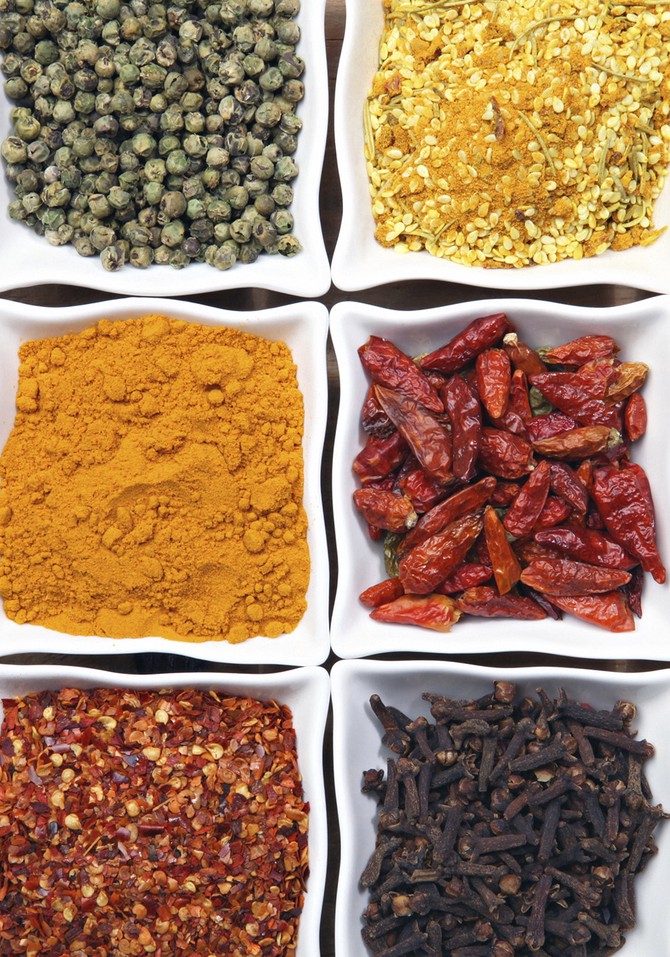A Truly Enlightened Approach to Weight Loss
Deepak Chopra, MD, shares his unique and effective perspective on eating well. Register and invigorate your life with the all-new Oprah & Deepak Meditation Experience.
By Corrie Pikul

Photo: Getty Images
The Motivation That Should Support Every Bite
What you've heard: Eat for fuel.
A new way to think about it: Eat for energy.
"Energy is about more than fueling your body—a higher kind of energy comes from the joy of eating," writes Deepak Chopra in his book, What Are You Hungry For?. Before siting down for a meal (or, say, a handful of white-cheddar puffs), Chopra recommends asking yourself these questions: Am I in a good mood? Is this meal going to be a positive experience? Is the food attractive and appealing? Can I devote my full attention to enjoying myself? If the answer is yes to all, he says that means you'll be getting the best energy (read: the most joy and fulfillment) from your food. If you come up with a no—now that you think about it, eating food straight out of the bag makes you feel lonely, sneaky and depressed—then Chopra says don't eat, or at least postpone eating until something changes: Your surroundings, your timing, your mindset. Note this doesn't mean you'll never eat cheese snacks again; you could measure a serving size of them into a serving dish and share with a friend. The point is: When you do eat them, you'll enjoy them more, consume less, and get more out of your experience
A new way to think about it: Eat for energy.
"Energy is about more than fueling your body—a higher kind of energy comes from the joy of eating," writes Deepak Chopra in his book, What Are You Hungry For?. Before siting down for a meal (or, say, a handful of white-cheddar puffs), Chopra recommends asking yourself these questions: Am I in a good mood? Is this meal going to be a positive experience? Is the food attractive and appealing? Can I devote my full attention to enjoying myself? If the answer is yes to all, he says that means you'll be getting the best energy (read: the most joy and fulfillment) from your food. If you come up with a no—now that you think about it, eating food straight out of the bag makes you feel lonely, sneaky and depressed—then Chopra says don't eat, or at least postpone eating until something changes: Your surroundings, your timing, your mindset. Note this doesn't mean you'll never eat cheese snacks again; you could measure a serving size of them into a serving dish and share with a friend. The point is: When you do eat them, you'll enjoy them more, consume less, and get more out of your experience

Photo: Getty Images
A New Word to Live By (and Eat By)
What you've heard: Fresh fruit, fresh veggies.
A new way to think about it: Everything you eat should be fresh.
Freshness and purity go way beyond farmer’s market veggies, believes Chopra. His advice: Toss the 3-day-old leftovers—if that vegetarian lasagna is full of locally grown spinach, it's been sitting in your fridge losing nutrients. Chopra also recommends eating mostly natural foods with minimal preservatives; and trying to consume produce as soon as possible after buying—or harvesting—it.
A new way to think about it: Everything you eat should be fresh.
Freshness and purity go way beyond farmer’s market veggies, believes Chopra. His advice: Toss the 3-day-old leftovers—if that vegetarian lasagna is full of locally grown spinach, it's been sitting in your fridge losing nutrients. Chopra also recommends eating mostly natural foods with minimal preservatives; and trying to consume produce as soon as possible after buying—or harvesting—it.

Photo: Thinkstock
A Different Way to Look at Your Plate
What you've heard: Every meal should include a rainbow of colors.
A new way to think about it: Every meal should include six tastes.
Call it post-supper syndrome: After eating a supposedly satisfying, nutritious dinner, you find yourself craving something you can't quite put your finger on; some flavor to round out the meal. The usual answer? Ice cream, chocolate, cheese. One way to avoid this is to take a more Ayurvedic approach and include six tastes in every meal: sweet, sour, salty and bitter, as well as the less-common pungent and stringent. In the centuries that preceded modern nutrition, Chopra explains, this way of eating not only ensured that the major food groups and nutrients were represented, but it also provided a feeling of completeness. And as you know, when you finish a meal feeling satisfied, you will be much less likely to find yourself raiding the refrigerator two hours later.
A new way to think about it: Every meal should include six tastes.
Call it post-supper syndrome: After eating a supposedly satisfying, nutritious dinner, you find yourself craving something you can't quite put your finger on; some flavor to round out the meal. The usual answer? Ice cream, chocolate, cheese. One way to avoid this is to take a more Ayurvedic approach and include six tastes in every meal: sweet, sour, salty and bitter, as well as the less-common pungent and stringent. In the centuries that preceded modern nutrition, Chopra explains, this way of eating not only ensured that the major food groups and nutrients were represented, but it also provided a feeling of completeness. And as you know, when you finish a meal feeling satisfied, you will be much less likely to find yourself raiding the refrigerator two hours later.

Photo: Thinkstock
A More Realistic Strategy to Deal with Temptation
What you've heard: Satisfy cravings with more healthful alternatives.
A new way to think about it: Give in to cravings—but not necessarily with food.
There are times when the only thing that will make you happy is an éclair. But much more often, your craving can be satisfied by something else, be it a banana, or a chocolate-covered banana, or a break from sitting at your desk...or something less obvious, like an affirmation that you're loved. Don't ignore temptations, Chopra writes. Instead, look at them this way: "Cravings mean that my body wants to be satisfied. I will give it what it wants by tuning in and listening. I'd like to be fulfilled, and food isn't the only way to get there. The happier I make myself, the less I will use food as a crutch."
A new way to think about it: Give in to cravings—but not necessarily with food.
There are times when the only thing that will make you happy is an éclair. But much more often, your craving can be satisfied by something else, be it a banana, or a chocolate-covered banana, or a break from sitting at your desk...or something less obvious, like an affirmation that you're loved. Don't ignore temptations, Chopra writes. Instead, look at them this way: "Cravings mean that my body wants to be satisfied. I will give it what it wants by tuning in and listening. I'd like to be fulfilled, and food isn't the only way to get there. The happier I make myself, the less I will use food as a crutch."

Photo: Thinkstock
The Most Fulfilling Way to Think About Dieting
What you've heard: Eat less.
A new way to think about it: Let yourself be nourished by light.
Stop focusing on what you can't eat, also known as "the loss" involved with healthy eating resolutions, says Chopra, because these words have the power to sabotage your mind—and actions. Instead, change your message from one of restriction to one of choice. If you think of "light" as the opposite of "heavy," Chopra says it feels infinitely more appealing, and it also reminds you of all the wonderful things you can eat. Here's how to incorporate that word into your culinary vocabulary: Whenever possible, favor lighter foods (sautéed vegetables versus fried) and beverages (sparkling water with lemon instead of soda); look for shorter, more to-the-point ingredient lists; eat the amount that will make you feel buoyant and energized but not so full that you feel stuffed and immobilized.
Deepak Chopra, MD, is the author of What Are You Hungry For?: The Chopra Solution to Permanent Weight Loss, Well-Being, and Lightness of Soul, founder of The Chopra Foundation and co-founder of The Chopra Center. See him on Oprah's The Life You Want Weekend tour this fall.

Sign up now for Oprah & Deepak's all-new meditation experience.
A new way to think about it: Let yourself be nourished by light.
Stop focusing on what you can't eat, also known as "the loss" involved with healthy eating resolutions, says Chopra, because these words have the power to sabotage your mind—and actions. Instead, change your message from one of restriction to one of choice. If you think of "light" as the opposite of "heavy," Chopra says it feels infinitely more appealing, and it also reminds you of all the wonderful things you can eat. Here's how to incorporate that word into your culinary vocabulary: Whenever possible, favor lighter foods (sautéed vegetables versus fried) and beverages (sparkling water with lemon instead of soda); look for shorter, more to-the-point ingredient lists; eat the amount that will make you feel buoyant and energized but not so full that you feel stuffed and immobilized.
Deepak Chopra, MD, is the author of What Are You Hungry For?: The Chopra Solution to Permanent Weight Loss, Well-Being, and Lightness of Soul, founder of The Chopra Foundation and co-founder of The Chopra Center. See him on Oprah's The Life You Want Weekend tour this fall.

Sign up now for Oprah & Deepak's all-new meditation experience.
Published 04/10/2014

